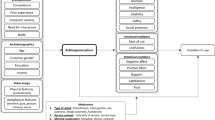Abstract
These comments claim that a shift has occurred between early discussions of online trust, where the focus was on the possibility of such trust and later ones, such as Ess’s, where the concern is more with the influence of the new communication technologies on trust in general. The comments, then, focus on affordance as examined by Ess, arguing that it is, indeed, a central issue in new communications and trust.
Similar content being viewed by others
References
Cocking, D., & Matthews, S. (2000). Unreal friends. Ethics and Information Technology, 2, 223–231.
Douglas, K. M. (2007). Psychology, discrimination and hate groups online. In A. N. Joinson, K. McKenna, & T. Postmes (Eds.), The Oxford handbook of internet psychology (pp. 155–164). Oxford: Oxford University Press.
Dreyfus, H. L. (2001). On the internet. London: Routledge.
Eneman, M. (2005). The new face of child pornography. In M. Klang & A. Murray (Eds.), Human rights in the digital age. Sydney: Cavendish.
Nissenbaum, H. (2001a). Securing trust online: wisdom or oxymoron? Boston University Law Review, 81, 101–131.
Nissenbaum, H. (2001b). How computer systems embody values. IEEE Computer, March, 118–120.
Ortega, Y., & Gasset, J. (1961). Man the technician. History as a System: And Other Essays Toward a Philosophy of History, (trans: Weyl, H.) (pp 87–161). New York: W.W. Norton & Company.
Pettit, P. (2004). Trust, reliance and the Internet. Analysis and Kritik, 26, 108–121.
Quayle, E., & Taylor, M. (2003). Model of problematic Internet use in people with a sexual interest in children. Cyber Psychology &Behaviour, 6(1), 93–106.
Author information
Authors and Affiliations
Corresponding author
Rights and permissions
About this article
Cite this article
Weckert, J. Comments on “Trust and New Communication Technologies: Vicious Circles, Virtuous Circles, Possible Futures”. Know Techn Pol 23, 307–309 (2010). https://doi.org/10.1007/s12130-010-9115-7
Received:
Accepted:
Published:
Issue Date:
DOI: https://doi.org/10.1007/s12130-010-9115-7




